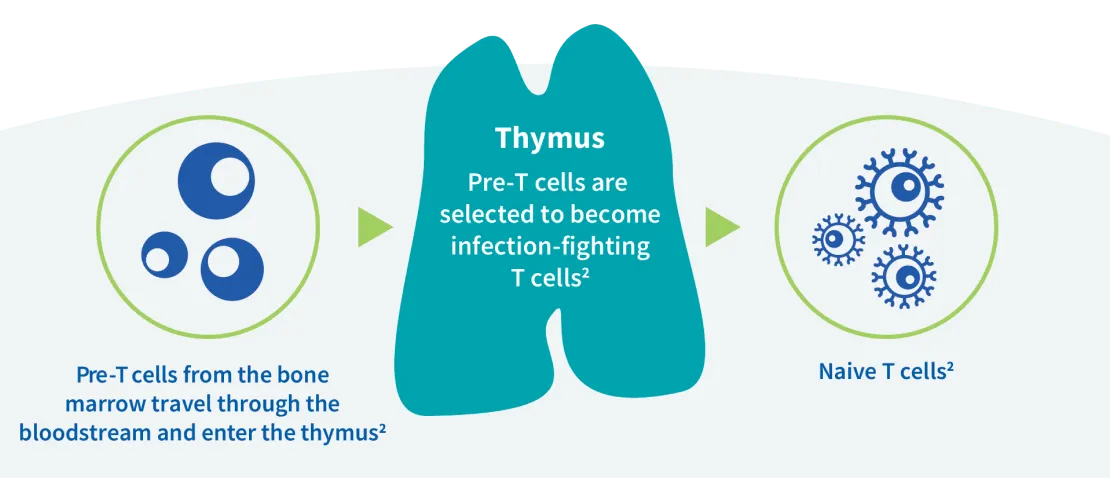References: 1. RETHYMIC [package
insert]. Marlborough, MA: Sumitomo Pharma America, Inc; 2024.
2. Sumitomo Pharma America, Inc. Enzyvant
receives FDA approval for RETHYMIC® (allogeneic processed thymus
tissue-agdc), a one-time regenerative tissue-based therapy for pediatric
congenital athymia. Accessed June 27, 2024.
https://www.us.sumitomo-pharma.com/newsroom/press-releases/Enzyvant-Receives-FDA-Approval-for-RETHYMIC-allogeneic-processed-thymus-tissue-agdc-a-One-Time-Regenerative-Tissue-Based-Therapy-for-Pediatric/
3. Markert ML, McCarthy EA, Gupton SE,
Lim AP. Cultured thymus tissue transplantation. In: Sullivan KE, Stiehm
ER, eds. Stiehm’s Immune Deficiencies: Inborn Errors of Immunity.
2nd ed. Elsevier; 2020:1229-1239.
References: 1. Collins C, Sharpe E,
Silber A, Kulke S, Hsieh EWY. Congenital athymia: genetic etiologies,
clinical manifestations, diagnosis, and treatment. J Clin Immunol.
2021;41(5):881-895. doi:10.1007/s10875-021-01059-7
2. Markert ML, Gupton SE, McCarthy EA. Experience with
cultured thymus tissue in 105 children. J Allergy Clin Immunol.
2022;149(2):747-757. doi:10.1016/j.jaci.2021.06.028
3. Immune Deficiency
Foundation. Patient & Family Handbook for Primary Immunodeficiency Diseases. 6th ed. 2019.
4. Hsieh EWY, Kim-Chang JJ, Kulke S, Silber A, O’Hara
M, Collins C. Defining the clinical, emotional, social, and financial
burden of congenital athymia. Adv Ther. 2021;38(8):4271-4288.
doi:10.1007/s12325-021-01820-9
5. RETHYMIC [package insert]. Marlborough, MA: Sumitomo
Pharma America, Inc; 2024.
6. Sumitomo Pharma America, Inc. Enzyvant receives FDA
approval for RETHYMIC® (allogeneic processed thymus tissue-agdc), a
one-time regenerative tissue-based therapy for pediatric congenital
athymia. Accessed June 27, 2024.
https://www.us.sumitomo-pharma.com/newsroom/press-releases/Enzyvant-Receives-FDA-Approval-for-RETHYMIC-allogeneic-processed-thymus-tissue-agdc-a-One-Time-Regenerative-Tissue-Based-Therapy-for-Pediatric/
References: 1. Collins C, Sharpe E,
Silber A, Kulke S, Hsieh EWY. Congenital athymia: genetic etiologies,
clinical manifestations, diagnosis, and treatment.
J Clin Immunol.
2021;41(5):881-895. doi:10.1007/s10875-021-01059-7
2. Markert ML, Gupton SE, McCarthy EA. Experience with
cultured thymus tissue in 105 children. J Allergy Clin Immunol.
2022;149(2):747-757. doi:10.1016/j.jaci.2021.06.028
3. RETHYMIC [package insert]. Marlborough, MA: Sumitomo
Pharma America, Inc; 2024. 4. Sumitomo Pharma America, Inc.
Enzyvant receives FDA approval for RETHYMIC® (allogeneic processed thymus
tissue-agdc), a one-time regenerative tissue-based therapy for pediatric
congenital athymia. Accessed June 27, 2024.
https://www.us.sumitomo-pharma.com/newsroom/press-releases/Enzyvant-Receives-FDA-Approval-for-RETHYMIC-allogeneic-processed-thymus-tissue-agdc-a-One-Time-Regenerative-Tissue-Based-Therapy-for-Pediatric/
References: 1. RETHYMIC [package
insert]. Marlborough, MA: Sumitomo Pharma America, Inc; 2024.
2. Sumitomo Pharma America, Inc. Enzyvant receives FDA
approval for RETHYMIC® (allogeneic processed thymus tissue-agdc), a
one-time regenerative tissue-based therapy for pediatric congenital
athymia. Accessed June 27, 2024.
https://www.us.sumitomo-pharma.com/newsroom/press-releases/Enzyvant-Receives-FDA-Approval-for-RETHYMIC-allogeneic-processed-thymus-tissue-agdc-a-One-Time-Regenerative-Tissue-Based-Therapy-for-Pediatric/
3. Markert ML, McCarthy EA, Gupton SE, Lim AP. Cultured thymus tissue transplantation. In: Sullivan KE, Stiehm ER, eds. Stiehm’s Immune Deficiencies: Inborn Errors of Immunity. 2nd ed. Elsevier; 2020:1229-1239.
References: 1. RETHYMIC [package
insert]. Marlborough, MA: Sumitomo Pharma America, Inc; 2024.
2. Markert ML, Gupton SE, McCarthy EA. Experience with
cultured thymus tissue in 105 children.
J Allergy Clin Immunol. 2022;149(2):747-757.
doi:10.1016/j.jaci.2021.06.028 3. Markert ML, McCarthy
EA, Gupton SE, Lim AP. Cultured thymus tissue transplantation. In:
Sullivan KE, Stiehm ER, eds.
Stiehm’s Immune Deficiencies: Inborn Errors of Immunity. 2nd ed.
Elsevier; 2020:1229-1239.
References:
1. Markert ML, McCarthy EA, Gupton SE, Lim AP. Cultured thymus tissue transplantation. In: Sullivan KE, Stiehm ER, eds. Stiehm’s Immune Deficiencies: Inborn Errors of Immunity. 2nd ed. Elsevier; 2020:1229-1239.
2. RETHYMIC [package insert]. Marlborough, MA: Sumitomo Pharma America, Inc; 2024.
3. Food and Drug Administration. Summary Basis for Regulatory Action. October 8, 2021. BLA STN: 125685/0
4. Sumitomo Pharma America, Inc. Enzyvant receives FDA approval for RETHYMIC® (allogeneic processed thymus tissue-agdc), a one-time regenerative tissue-based therapy for pediatric congenital athymia. Accessed June 27, 2024.
https://www.us.sumitomo-pharma.com/newsroom/press-releases/Enzyvant-Receives-FDA-Approval-for-RETHYMIC-allogeneic-processed-thymus-tissue-agdc-a-One-Time-Regenerative-Tissue-Based-Therapy-for-Pediatric/
References: 1. RETHYMIC [package
insert]. Marlborough, MA: Sumitomo Pharma America, Inc; 2024.
2. Sumitomo Pharma America, Inc. Enzyvant receives FDA
approval for RETHYMIC® (allogeneic processed thymus tissue-agdc), a
one-time regenerative tissue-based therapy for pediatric congenital
athymia. Accessed June 27, 2024.
https://www.us.sumitomo-pharma.com/newsroom/press-releases/Enzyvant-Receives-FDA-Approval-for-RETHYMIC-allogeneic-processed-thymus-tissue-agdc-a-One-Time-Regenerative-Tissue-Based-Therapy-for-Pediatric/
References:
1. Hsieh EWY, Kim-Chang JJ, Kulke S, Silber A, O’Hara M,
Collins C. Defining the clinical, emotional, social, and financial burden of
congenital athymia. Adv Ther. 2021;38(8):4271-4288. doi:10.1007/s12325-021-01820-9
2. RETHYMIC [package
insert]. Marlborough, MA: Sumitomo Pharma America, Inc; 2024.
References:
1. RETHYMIC [package insert]. Marlborough, MA: Sumitomo
Pharma America, Inc; 2024. 2. Markert ML, McCarthy EA,
Gupton SE, Lim AP. Cultured thymus tissue transplantation. In: Sullivan
KE, Stiehm ER, eds.
Stiehm’s Immune Deficiencies: Inborn Errors of Immunity. 2nd ed.
Elsevier; 2020:1229-1239 3. Gupton SE, McCarthy EA,
Markert ML. Care of children with DiGeorge before and after cultured
thymus tissue implantation. J Clin Immunol. 2021;41(5):896-905.
doi:10.1007/s10875-021-01044-0


